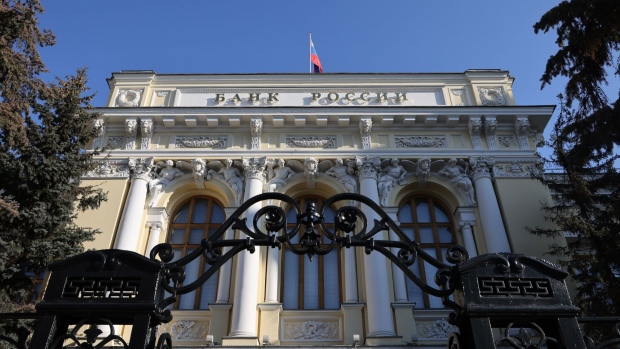Mar 29, 2024
Bank of Russia Sees No Alternative to Yuan for Its Reserves
, Bloomberg News

(Bloomberg) -- Russia’s central bank said it has no better options than the Chinese yuan for its reserves after two years of the Kremlin’s war on Ukraine and the subsequent seizure of its international assets.
There are limited alternatives to China’s currency for use as reserves because the financial instruments of nations that are friendly to Russia carry too many risks, the central bank wrote in its annual report released Friday.
“The exchange rates of these currencies are highly volatile, the markets have low liquidity, and in a number of such countries there are restrictions on the movement of capital, which is an obstacle to their use,” the report said. “These factors predetermine the key role of the Chinese yuan in the formation of reserve assets.”
China has played an increasingly important role in Russia’s economy as President Vladimir Putin has sought to reorient trade toward Asia and away from Europe in the wake of sanctions over the war. Trade with Beijing has been a key factor in allowing Russia’s economy to weather the sanctions, along with increased government spending.
Read more: War in Ukraine Drains Nearly Half of Russia’s Liquid Assets
The central bank also said the role the Chinese yuan has played internationally and its liquidity have “significantly increased” in recent years. Last year, the yuan replaced the US dollar as the most traded currency in Russia. Before the invasion, the yuan’s trading volume on the Russian market was negligible.
As of March 22, Russia’s international reserves stood at $590.1 billion, having decreased by about $40 billion over two years of the war, according to data from the central bank. That includes the $300 billion of reserves blocked by Western countries, which the bank said it’s working to protect since it retains ownership rights to the assets.
Read more: EU Drafts Law to Send Russian Central Bank Profits to Ukraine
In 2023, the value of Russia’s reserves grew slightly, but “the main factor in this increase was the rise in the price of gold in US dollars,” the report said. Since the beginning of the war, the central bank has not revealed the composition of international reserves, instead only reporting the shares of gold and foreign currency.
©2024 Bloomberg L.P.





